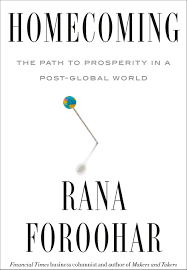You have /5 articles left.
Sign up for a free account or log in.
 Homecoming: The Path to Prosperity in a Post-Global World by Rana Foroohar
Homecoming: The Path to Prosperity in a Post-Global World by Rana Foroohar
Published in October 2022
Higher education is not ignored in Rana Foroohar’s Homecoming. Thankfully (I guess), the problems of universities are diagnosed as symptoms of neoliberalism, not their cause. With all the bad press that elite education is getting, perhaps we should be grateful.
Or maybe not. It is hard to read Homecoming through higher ed eyes and feel all too optimistic about the future of our industry. If Foroohar, a business reporter for the Financial Times, is correct, then the world is rapidly moving toward an era of deglobalization.
Reading Bob Ubell’s piece in EdSurge about the potential drop in Chinese students studying in the U.S., an influx that accounts for over $15 billion per year in revenues for American colleges and universities, is a reminder of how dependent higher education is on globalism.
My favorite line from Bob’s article is, “Over the years, American colleges got high on Chinese cash, with Chinese funds often helping to stabilize rocky higher ed finances.” (Emphasis mine … couldn’t resist.)
Chinese imports (in the form of imported students) may have been good for U.S. universities, but according to Foroohar, this trade has been bad for almost everyone else. The offshoring of manufacturing jobs to low-wage-labor countries such as China has succeeded in delivering cheap goods for the U.S., but at the price of decimating entire communities from which the jobs departed.
In Homecoming, Foroohar argues that both economists and politicians are increasingly turning away from economic efficiency as the goal of policy and instead are starting to prioritize resiliency. In practice, this means tax, tariff, investment and industrial policies that aim to build manufacturing capacity in the U.S. This change was reflected first in Trump’s trade war with China and more recently in legislation such as the Inflation Reduction Act that will result (among many other things) in tax incentives to build and buy electric vehicles assembled in the U.S.
The cameo role that universities play in Homecoming is that of both victim and mirror of neoliberal ideology. Faith in market mechanisms over government action resulted in the decline of state dollars to support public institutions and the rise of the for-profit education sector. Higher education mirrors the social inequalities that result when markets are unchecked in the concentrated wealth, status and prestige of a few elite institutions measured against the struggles of large numbers of tuition-dependent colleges to remain financially viable.
Is Homecoming persuasive? Among my progressive academic friends and colleagues (and truthfully, that is almost everyone in my academic innovation network), there are few defenders of neoliberalism. In reading Homecoming, however, I wanted to hear more from the other side.
The way my social scientist brain works is that the most convincing hypotheses are those in which the most energy is spent on disconfirming.
There is little doubt that trade with low-wage, low-labor-protection, low-environmental-regulation and low-political-freedom countries like China hurts many U.S. workers and communities. Are there examples of where imports from China (say, of raw materials) are critical to high-paid U.S.-based manufacturing jobs? What sort of local employment depends on exports?
It might be that on balance, economic policies that rely on market mechanisms rather than targeted government investment in strategic industries and tariffs over free trade have indeed been bad for the U.S. If Homecoming had given more pages to the defenders of markets and trade, then the time spent in the book with the critics of these policies would have had more impact.
Likely, I’m being overly critical of Homecoming—a result of a deep suspicion of any argument that agrees with what I think. Progressive economics seems so appealing that it must be wrong. Give me a book that challenges rather than confirms my assumptions, and I’m a happy reader.
What are you reading?




